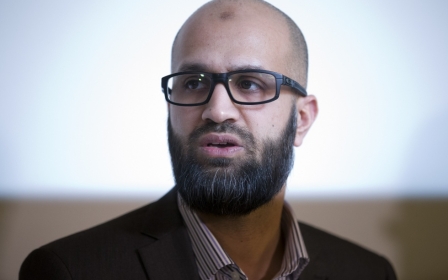The Federal Bureau of Instigation

On 25 February, a press release appearing on the FBI’s website announced that three Brooklyn residents had been charged with “attempt and conspiracy to provide material support to the Islamic State of Iraq and the Levant (ISIL), a foreign terrorist organisation”.
Never mind that the same charge - albeit at a much higher level - can be applied to the United States and a number of its allies, without whom ISIL would not currently be flourishing.
In the US view, of course, it’s better not to get bogged down in big-picture analysis and to focus instead on a constant succession of mini-apocalypses narrowly averted by FBI & Co.
The latest episode features three villains between the ages of 19 and 30, two of them immigrants from Uzbekistan and one from Kazakhstan. Two are accused of plotting to join the jihad in Syria, the third of financially facilitating the plan.
According to the criminal complaint detailing the charges, suspicious online activity led federal agents to interrogate Abdurasul Hasanovich Juraboev, one of the aspiring jihadists, in August 2014. During their chat, Juraboev “stated that he would like to travel to Syria to engage in violence on behalf of ISIL… but currently lacked the means to travel there” and also “stated that he would harm President Barack Obama if he had the opportunity to do so, but currently does not have the means or an imminent plan to do so.”
The lack of means in the first scenario was eventually resolved, apparently, and Juraboev and his co-conspirator, 19-year-old Akhror Saidakhmetov, booked flights to Turkey, with the latter set to depart first. The complaint claims that Saidakhmetov “also proposed finding an excuse to gain access to the pilot’s cabin and diverting the plane to the Islamic State, so that the Islamic State would gain a plane”.
Saidakhmetov’s arrest last week at JFK Airport thus enabled US news outlets to dispense sensational headlines like: “FBI: Three Brooklyn Men Attempted to Join ISIS, Hijack Commercial Flight.”
Of course, cockpit access isn’t quite what it used to be. And commandeering a large aircraft that one is not trained to operate would presumably require a bit more planning beyond the suggestion that it might be cool.
Terror cultivation
In a series of articles related to the triple arrest, the New York Times comments on Juraboev and Saidakhmetov’s potential targeting of domestic fixtures like Obama: “[T]heir threats of violence had an ‘aspirational’ quality to them, according to law enforcement officials, with no indication that the suspects were close to staging an attack, large or small.”
Lest we come away from the affair with the inkling that maybe the FBI overreacted, the Times ends its 28 February dispatch with a not completely intelligible but nonetheless ominous quote from an anonymous official: “Nobody who ever got killed by a terrorist got killed by a terrorist who was not aspirational first. Ask the dead guys.”
In the event we wanted to prolong our question-and-answer session with the dead, we might ask some of the civilian victims of Obama’s drone strikes for their thoughts on the president’s anti-terror aspirations.
Buried within the Times’ coverage, meanwhile, is a certain pertinent detail, which is that “the case against the three men relies in part on a confidential informant paid by the government, court documents show.”
Curiously, the provided hyperlink takes us to the website of the Department of Justice, which features the same press release as the FBI site. In neither place is any mention made of a paid informant.
The criminal complaint itself, however, does mention just such a character, who, “posing as an ideologically sympathetic individual” at an area mosque, strikes up a friendship with Juraboev and Saidakhmetov. Soon to follow are joint plans to travel to Syria, joint video-viewing sessions of ISIL training camps, and so forth.
As journalist Murtaza Hussain points out in his analysis for The Intercept, the informant appears to have played an “integral role… in generating the charges against the men, and helping turn a fantastical ‘plot’ into something even remotely tangible.” Only after the informant’s emergence on the scene, it seems, “did any actual arrangements to commit a criminal act come into existence”.
Hussain reasons that in the almost seven months “after a seemingly unhinged Juraboev openly expressed his violent and criminal fantasies to FBI agents, other tactics of intervention” might have been pursued to discourage rather than fuel a violent trajectory.
At the very least, the informant might have refrained from helping Saidakhmetov procure travel documents after his mother confiscated his passport.
An enterprising agency
As I wrote in an article last year about “Informants,” a documentary by Al-Jazeera’s Investigative Unit, the FBI has over 15,000 such mercenaries, many of them assigned to Muslim communities.
Darren Griffin, an informant featured in the film, earned more than $350,000 for his services, which consisted of faking a conversion to Islam and incriminating a young mosque patron by the name of Mohamad Amawi for allegedly conspiring to kill or maim people outside the United States.
In addition to arranging for Amawi to receive training in firearms, bomb detonation and combat tactics, Griffin tasked him with transporting laptops to the Middle East to be smuggled to “brothers” in Iraq and Syria. Using FBI funds, Griffin also paid Amawi’s rent.
The young man - whose inability to cover his own living accommodations called into question his capacity to embark on intercontinental killing sprees - was sentenced to 20 years in jail.
In another recent Intercept article, Glenn Greenwald and Andrew Fishman describe a “now-familiar FBI pattern whereby the agency does not disrupt planned domestic terror attacks but rather creates them, then publicly praises itself for stopping its own plots.”
The whole issue of legality is conveniently skirted, the authors explain, as “subservient US courts uphold the charges by applying such a broad and permissive interpretation of ‘entrapment’ that it could almost never be successfully invoked.”
The informants aren’t the only ones making a buck off the process, as the FBI’s handcrafted counter-terror victories justify the agency’s inflated budget. And there are plenty of targets to pick from - according to the New York Times, “there are reportedly from 700,000 to a million names on the United States terrorism watch list alone.”
The more Islamic State (IS) can be portrayed as a threat to the US then, the better it is for law enforcement coffers. It’s perhaps unsurprising that the chief of the FBI’s New York division has - the Times notes - “appealed to members of the community and religious leaders to come forward if they fear someone is being radicalised”.
But policies actively encouraging racial and religious profiling as well as inter- and intra-communal suspicion obviously do nothing in terms of fostering cohesive societies in which delusional and antisocial fantasies might stand less of a chance of thriving.
Suspicious activity
In a February blog post for the American Civil Liberties Union (ACLU), staff attorney Julia Harumi Mass writes that, thanks to an ACLU lawsuit challenging a certain Suspicious Activity Reporting initiative, the federal government will now be required to defend this “vast and secret domestic surveillance programme… in open court”.
Established in the aftermath of 9/11, the initiative depends on reports of perceived “suspicious activity” from local law enforcement officials as well as average folks. The reports are collected in a gargantuan FBI database and, in fine democratic tradition, the programme has “largely been shielded from judicial review [and] has never been subject to public scrutiny”.
As Harumi Mass observes, the ensuing rampant violation of rights has been facilitated by the fact that “the government’s loose standards define practically anything as suspicious.” Except, of course, its own truly suspicious behaviour.
- Belen Fernandez is the author of The Imperial Messenger: Thomas Friedman at Work, published by Verso. She is a contributing editor at Jacobin magazine.
The views expressed in this article belong to the author and do not necessarily reflect the editorial policy of Middle East Eye.
Photo: New York Police Commissioner Bill Bratton speaks at a news conference where he discussed the arrest of three Brooklyn men who allegedly plotted to travel to Syria to join ISIS on February 25 (AFP)
New MEE newsletter: Jerusalem Dispatch
Sign up to get the latest insights and analysis on Israel-Palestine, alongside Turkey Unpacked and other MEE newsletters
Middle East Eye delivers independent and unrivalled coverage and analysis of the Middle East, North Africa and beyond. To learn more about republishing this content and the associated fees, please fill out this form. More about MEE can be found here.





